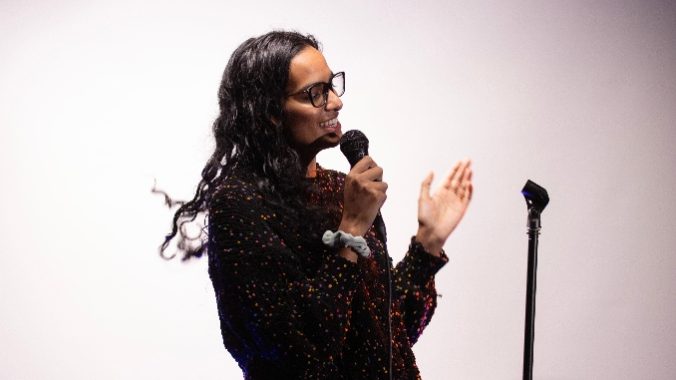Abby Govindan Launched Jungle Cat Comedy to Fill a Hole in the NYC Comedy Scene
Photo courtesy of Abby Govindan
By the time I went to watch comedian Abby Govindan perform a stand-up set last month, I’d been seeing her tweets on my timeline for years—including an inadvertent interaction in 2021 with Logan Paul over whether lunch with him or $500,000 would be the fiscally smarter move, and other tweets, like her 2020 hit lauding Ghislaine Maxwell as a female trailblazer in the “male dominated field” of sex trafficking. When I saw Govindan, she was co-hosting her newly launched, weekly New York City show, Jungle Cat Comedy, with her co-host and friend Mohanad Elshieky. Govindan also performed a set of her own, with a wide range of jokes that touched on her father’s no-nonsense texting style and, of course, the time she scammed the KKK out of free textbooks for a course in college.
Speaking to Paste, Govindan says she and Elshieky created Jungle Cat Comedy to fill a void in reliable, weekly comedy shows in New York City. They also wanted to carve a space for comedians with a diverse range of lived experiences to perform as their authentic selves, without pressure to “tokenize” or “throw their identities under the bus.” Their opening show on January 18 included performers who have been featured on Saturday Night Live, Ramy, The Tonight Show, and Comedy Central, and unapologetically referenced personal experiences with gender identity, disability, and growing up with immigrant parents. For their third show on February 1, Jungle Cat Comedy featured The Daily Show’s Roy Wood Jr.
For Govindan, whose experience in the world of stand-up comedy actually began by telling hit jokes online, Jungle Cat Comedy—and the solo comedy hour she’s touring across the country this year—are an exercise in creating space for herself and young comics like her. “I think a lot of venues want someone who’s more seasoned, more experienced, which is very fair—but I also think it’s frustrating to constantly be underestimated when, outside of my internet comedy, I’m good at stand-up,” Govindan said. Internet comedy may be how Govindan made a name for herself, as one of few young South Asian women who cultivated a wide-reaching following in the late 2010s. But viral tweets were just a first step on her unique comedic trajectory, one she’s deeply grateful for while also holding mixed feelings about learning and growing as a comic—and person—for all the internet to see.
Govindan talked to Paste about launching Jungle Cat Comedy, Elon Musk’s acquisition of Twitter, telling family stories without exploiting them, building a long-term comedy career off some viral 2018 tweets, and more.
Paste Magazine: Why “Jungle Cat Comedy”? Is there a particular jungle cat you find most relatable?
Abby Govindan: So, my co-host [Elshieky] and I love cats, and he suggested “Calico Cat Comedy,” and I suggested “Jungle Cat,” and we just got attached to that, because he’s from Libya and my family is from India, which are both seen in the West as “jungle countries.” We’re proud to be [from] where we’re from and also like this association of the jungle from the Jungle Book which stars a little Indian kid. Once we hopped into the theme, there was really no looking back, our producers put together this gorgeous, lush green poster. We really leaned into the theme and it just fit our personalities.
Paste: How did you get your start in comedy? When did you first realize you were funny?
Govindan: I always enjoyed making people laugh at the lunch table and stuff. Then, I think in 2017, the guy I thought was the love of my life had just broken up with me out of nowhere. I was so devastated and my parents were asking how they could help cheer me up. So, I was like, “Hey, will you guys help me pay for comedy classes?” So I took comedy classes and decided I wanted to do stand-up. I never, ever expected it to materialize into anything more than a hobby. But then some of my first jokes went viral in 2018, and I was able to make a career out of it really quickly, and I think I was making money off of it by like 2020.
Paste: What inspired you to create Jungle Cat Comedy? What do you look for in comedians for your line-ups?
Govindan: So I started The Illuminati Presents last year, because we wanted to create this space within comedy for people to be their most authentic selves without having to worry about being palatable to anyone. A lot of the comedy producers and bookers and hosts are cis white guys, and so we really wanted to cultivate this environment of inclusivity, but also not tokenism. A lot of us feel like we have to make our experiences palatable in order to be seen as viable options in comedy lineups. So, we just put together lineups of people whose comedy we enjoy, not because they talk about being a minority or because they talk about, you know, their experiences, but more so because we just think they’re funny and they shouldn’t have to feel like they have to be tokens in order for us to book them.
Paste: What do you think was missing from the New York comedy scene before Jungle Cat Comedy?
-

-

-

-

-

-

-

-

-

-

-

-

-

-

-

-

-

-

-

-

-

-

-

-

-

-

-

-

-

-

-

-

-

-

-

-

-

-

-

-








































